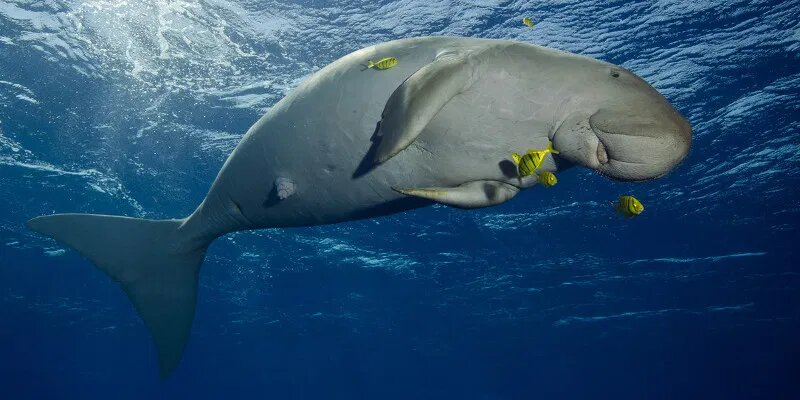Biodiversity & Environment
World Dugong Day 2020
- 28 May 2020
- 3 min read
Why in News
World Dugong Day is celebrated on 28th May, every year.
Key Points
- Dugong (Dugong dugon) also called ‘Sea Cow’ is one of the four surviving species in the Order Sirenia and it is the only existing species of herbivorous mammal that lives exclusively in the sea including in India.
- They are listed as Vulnerable on the IUCN Red List and are protected in India under Schedule I of the Wild (Life) Protection Act, 1972.
- According to a 2013 survey report of the Zoological Survey of India (ZSI), there were only about 200 dugongs in the Gulf of Mannar in Tamil Nadu, the Andaman and Nicobar Islands and the Gulf of Kutch in Gujarat.
- Dugongs are an important part of the marine ecosystem and their depletion will have effects all the way up the food chain. Proper conservation is the only way to save dugongs from extinction.
- Threats:
- Dugongs graze on seagrass and the loss of seagrass beds due to ocean floor trawling is one of the most important factors behind decreasing dugong populations in many parts of the world.
- Trawling is a method of fishing that involves pulling a fishing net through the water behind one or more boats. It is harmful to the environment because it damages the seafloor, coral reefs and other marine animals.
- Human activities such as the destruction and modification of habitat, pollution, rampant illegal fishing activities, vessel strikes, unsustainable hunting or poaching and unplanned tourism are the main threats to dugongs.
- Dugong meat is consumed under the wrong impression that it cools down human body temperature.
- Dugongs graze on seagrass and the loss of seagrass beds due to ocean floor trawling is one of the most important factors behind decreasing dugong populations in many parts of the world.
- Steps Taken for Conservation:
- In February 2020, India hosted the 13th Conference of Parties (CoP) of the Convention on the Conservation of Migratory Species of Wild Animals (CMS), an environmental treaty under the aegis of the United Nations Environment Programme (UNEP).
- The Government of India is a signatory to the CMS since 1983.
- India has signed non-legally binding Memorandums of Understanding (MoU) with CMS on the conservation and management of Siberian Cranes (1998), Marine Turtles (2007), Dugongs (2008) and Raptors (2016).
- The Ministry of Environment, Forests and Climate Change constituted a ‘Task Force for Conservation of Dugongs’ to look into issues related to conservation of dugongs and implementation of the ‘UNEP/CMS Dugong MoU’ in India.
- It also facilitates India to act as the leading nation in the South Asia Sub-region with respect to dugong conservation.
- In February 2020, India hosted the 13th Conference of Parties (CoP) of the Convention on the Conservation of Migratory Species of Wild Animals (CMS), an environmental treaty under the aegis of the United Nations Environment Programme (UNEP).







